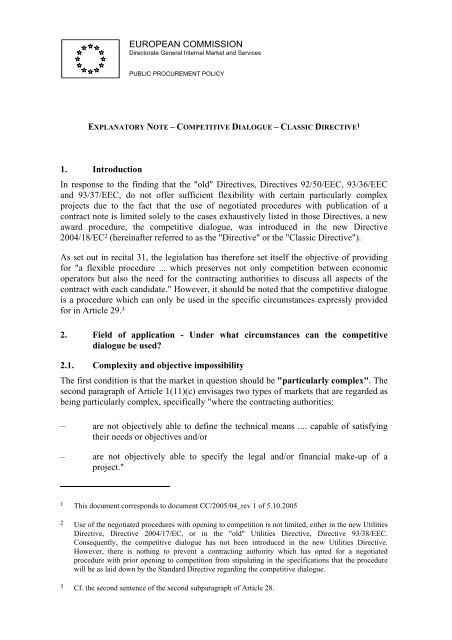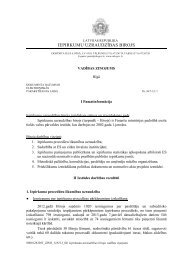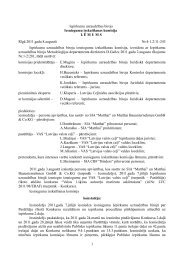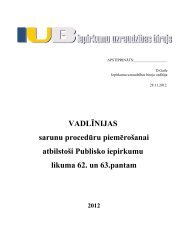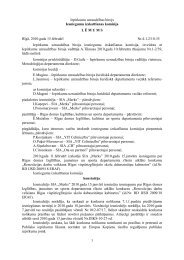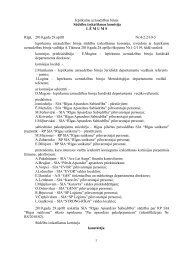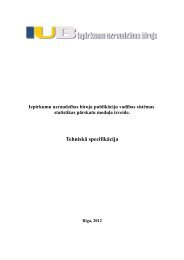Explanatory Note - Competitive Dialogue - European Commission
Explanatory Note - Competitive Dialogue - European Commission
Explanatory Note - Competitive Dialogue - European Commission
You also want an ePaper? Increase the reach of your titles
YUMPU automatically turns print PDFs into web optimized ePapers that Google loves.
EUROPEAN COMMISSION<br />
Directorate General Internal Market and Services<br />
PUBLIC PROCUREMENT POLICY<br />
EXPLANATORY NOTE – COMPETITIVE DIALOGUE – CLASSIC DIRECTIVE 1<br />
1. Introduction<br />
In response to the finding that the "old" Directives, Directives 92/50/EEC, 93/36/EEC<br />
and 93/37/EEC, do not offer sufficient flexibility with certain particularly complex<br />
projects due to the fact that the use of negotiated procedures with publication of a<br />
contract note is limited solely to the cases exhaustively listed in those Directives, a new<br />
award procedure, the competitive dialogue, was introduced in the new Directive<br />
2004/18/EC 2 (hereinafter referred to as the "Directive" or the "Classic Directive").<br />
As set out in recital 31, the legislation has therefore set itself the objective of providing<br />
for "a flexible procedure ... which preserves not only competition between economic<br />
operators but also the need for the contracting authorities to discuss all aspects of the<br />
contract with each candidate." However, it should be noted that the competitive dialogue<br />
is a procedure which can only be used in the specific circumstances expressly provided<br />
for in Article 29. 3<br />
2. Field of application - Under what circumstances can the competitive<br />
dialogue be used<br />
2.1. Complexity and objective impossibility<br />
The first condition is that the market in question should be "particularly complex". The<br />
second paragraph of Article 1(11)(c) envisages two types of markets that are regarded as<br />
being particularly complex, specifically "where the contracting authorities:<br />
– are not objectively able to define the technical means .... capable of satisfying<br />
their needs or objectives and/or<br />
– are not objectively able to specify the legal and/or financial make-up of a<br />
project."<br />
1 This document corresponds to document CC/2005/04_rev 1 of 5.10.2005<br />
2 Use of the negotiated procedures with opening to competition is not limited, either in the new Utilities<br />
Directive, Directive 2004/17/EC, or in the "old" Utilities Directive, Directive 93/38/EEC.<br />
Consequently, the competitive dialogue has not been introduced in the new Utilities Directive.<br />
However, there is nothing to prevent a contracting authority which has opted for a negotiated<br />
procedure with prior opening to competition from stipulating in the specifications that the procedure<br />
will be as laid down by the Standard Directive regarding the competitive dialogue.<br />
3 Cf. the second sentence of the second subparagraph of Article 28.
These provisions should be read in the light of the first part of recital 31: "Contracting<br />
authorities which carry out particularly complex projects may, without this being due to<br />
any fault on their part, find it objectively impossible to define the means of satisfying<br />
their needs or of assessing what the market can offer in the way of technical solutions<br />
and/or financial/legal solutions. This situation may arise in particular with the<br />
implementation of important integrated transport infrastructure projects, large computer<br />
networks or projects involving complex and structured financing the financial and legal<br />
make-up of which cannot be defined in advance."<br />
In view of the fact that this is a special procedure whose use is regulated, it is necessary<br />
to examine on a case by case basis the nature of the market in question, taking account of<br />
the capacity of the contracting authority concerned to verify whether use of the<br />
competitive dialogue would be justified. This is because the concept of objective<br />
impossibility is not an abstract concept; it is mitigated by the preciseness of the recital<br />
under which the contracting authorities concerned find themselves in this situation<br />
"without this being due to any fault on their part". In other words, the contracting<br />
authority has an obligation of diligence – if it is in a position to define the technical<br />
resources necessary or establish the legal and financial framework, the use of the<br />
competitive dialogue is not possible.<br />
It should be noted that amendments had been proposed during the legislative procedure<br />
aimed at limiting the use of competitive dialogue solely to cases where the prior<br />
organisation of a contest or the prior conclusion of a contract for the procurement of<br />
services (the completion of a study) would not have permitted the contracting authority<br />
to conclude the main contract (relating to the construction of a particularly complex<br />
project) through the use of an open or restricted procedure. This obligation has not been<br />
adopted by the legislation. The reason for this is that imposing it could present problems<br />
in certain cases, either as a result of the time required to conduct two award procedures<br />
and for the execution of the first contract or because of the risk that the first procedure<br />
could prove unproductive or the competition for the main contract would be insufficient<br />
if the service provider, the subject of the first contract, were to be excluded from<br />
participation in the second one in order to observe the principal of equality of treatment<br />
and/or the rule concerning the technical dialogue (recital 8).<br />
2.2. Technical complexity<br />
According to the wording of recital 31, technical complexity exists where the contracting<br />
authority is not able to define the means of satisfying its needs and/or able to achieve its<br />
objectives. Two cases may arise: either that the contracting authority would not be able<br />
to define the technical means to be used in order to achieve the prescribed solution; this<br />
should be fairly rare given the possibilities of establishing technical specifications –<br />
totally or partially - in terms of functionality or performance; 4 or – which would occur<br />
more often – that the contracting authority would not be able to determine which of<br />
several possible solutions would be best suited to satisfying its needs. In both cases, the<br />
contract in question would have to be considered as being particularly complex.<br />
Let us take the example of a contracting authority wanting to create a connection<br />
between the shores of a river – it might well be that the contracting authority cannot<br />
determine whether the best solution would be a bridge or a tunnel, even though it would<br />
4 I.e. through the use of one of the methods laid down in Article 23(3)(b), (c) and (d).<br />
2
e able to establish the specifications for the bridge (suspended, metal, in pre-stressed<br />
concrete, etc.) or the tunnel (with one or more tubes, to be constructed under or on the<br />
riverbed, etc.). In this case, use of a competitive dialogue would also be justified.<br />
As recalled by recital 31 – and to the extent they are not configured as concessions<br />
contracts – technical complexity could be present in the case of certain projects relating<br />
to the construction of major integrated transport infrastructure projects or the<br />
construction of major computer networks (although such cases are also likely to present<br />
legal or financial complexities).<br />
2.3. Legal or financial complexity<br />
Recital 31 states that a financial or legal complexity “may arise in particular … with the<br />
implementation of … projects involving complex and structured financing the financial<br />
and legal make-up of which cannot be defined in advance.” Obviously, such issues arise<br />
very, very often in connection with projects of Public Private Partnerships. 5<br />
One possible example of legal or financial complexity might be a situation in which the<br />
contracting authorities cannot foresee whether the economic operators will be prepared to<br />
accept such an economic risk that the contract will be a concession contract or whether<br />
ultimately it will end up being a "traditional" public contract. 6 In this situation a<br />
contracting authority considering it most likely that the contract will be a concession and<br />
consequently applying a procedure other than as laid down for public contracts 7 would<br />
find itself faced with difficult choices if it were to turn out at the end of the procedure<br />
that the contract would after all be a public contract and not a concessions contract. This<br />
is because the contracting authority could either conclude the contract and commit an<br />
infringement of Community law, with all the resultant risks of appeals or infringement<br />
proceedings, or cancel the procedure and restart it using one of the procedures laid down<br />
for concluding public contracts. In such cases, the competitive dialogue allows these<br />
problems to be avoided: this is because the procedural requirements would be satisfied<br />
whether the contract results in a public contract or a concessions contract.<br />
Another example of legal or financial complexity which could justify the use of the<br />
competitive dialogue (yet again concerning a form of private financing, or even a publicprivate<br />
partnership) can be found in the <strong>Commission</strong>'s administrative practice: the<br />
contracting authority planned to rebuild a school and wanted to limit the costs of this as<br />
much as possible by allowing the economic operators to propose different ways of<br />
remuneration by using land belonging to the contracting authority for various purposes<br />
5 There is, however, no automaticity - calling something a “PPP-project” does not in itself entail legal or<br />
financial complexity; it must always be examined whether the concrete case meets the conditions or<br />
not even though that will most often be the case.<br />
6 Of course, if the contracting authority is able to anticipate that the contract will definitively take the<br />
form of a concession of services – and this proves to be the case – it is not obliged to apply the<br />
provisions of the Directive (including those relating to the competitive dialogue) and can use a<br />
procedure which satisfies the requirements arising out of the Treaty (cf. footnote 6).<br />
7 Depending on the case, either the procedure laid down by concessions of works or a procedure<br />
complying with the requirements arising out of the Treaty, as interpreted by the Telaustria case-law.<br />
3
(housing construction, sports facilities, etc.), together with payment or not. 8 In the case in<br />
question this was a works contract and not a concession. Other examples of projects that<br />
most often justify recourse to the competitive dialogue could be projects in which the<br />
contracting authorities wish to have at their disposal a facility (school, hospital, prison,<br />
etc.) to be financed, built and operated by an economic operator (i.e. the latter would take<br />
care of maintenance works, maintenance services, guard services, catering services, etc.),<br />
often for a fairly long period. The legal and financial set-up is very often particularly<br />
complex and it may furthermore be uncertain from the outset whether the end result will<br />
be a concession or a public contract.<br />
3. Conduct of the procedure<br />
3.1. Contract notice, descriptive document and selection of economic operators<br />
The contracting authority makes known its "needs and requirements" in the contract<br />
notice and it defines them in the notice itself and/or in a descriptive document. 9 The<br />
substantial or fundamental elements of the notice and of the descriptive document may<br />
not be modified during the award procedure. 10<br />
As the selection is carried out "in accordance with the relevant provisions of Articles 44<br />
to 52", 11 the notice will have to state the minimum capacity levels. Where the<br />
competitive dialogue is justified by technical complexity, the contracting authorities can<br />
establish their requirements concerning the technical capacity of the economic operators<br />
on the basis of the definition of needs and requirements. If, for example, the contract<br />
relates to the establishment of an integrated transport infrastructure intended to serve a<br />
geographic area of size x with a transport capacity of y persons/hour without specifying a<br />
precise combination of the various means of transport, the candidates will have to prove<br />
their capacity to build such transport systems whatever the combination of means of<br />
transport they use for this purpose.<br />
If the contracting authorities intend to limit the number of participants to be invited to the<br />
dialogue (at least three), the notice will also have to contain "the objective and non-<br />
8 In the case in question, the contracting authority used a negotiated procedure with the publication of a<br />
contract notice, invoking an exemption from Directive 93/37/EEC corresponding to that laid down in<br />
Article 30(1)(b) of the Standard Directive ("in exceptional cases, when the nature of the works,<br />
supplies, or services or the risks attaching thereto do not permit prior overall pricing"). However, this<br />
derogation is to cover solely the exceptional situations in which there is uncertainty a priori regarding<br />
the nature or scope of the work to be carried out; it does not cover situations in which the uncertainties<br />
result from other causes, such as the difficulty of prior pricing owing to the complexity of the legal<br />
and financial package put in place.<br />
9 The "descriptive document" is the counterpart of the traditional "specifications". The term "descriptive<br />
document" was chosen to indicate that it was a document that may be less detailed and/or more<br />
prescriptive than "normal" specifications. It should be emphasised that the descriptive document may,<br />
for example, envisage legal/administrative/contractual conditions which will form part of the common<br />
basis for the conduct of the procedure and the preparation of tenders.<br />
10 See the end of the second subparagraph of Article 29(6) and the end of the second sentence of Article<br />
29(7).<br />
11 Article 29(3).<br />
4
discriminatory criteria or rules they intend to apply, the minimum number of candidates<br />
they intend to invite and, where appropriate, the maximum number." 12<br />
Where the contracting authorities intend to make use of the opportunity laid down in<br />
Article 29(4) 13 to gradually reduce the number of solutions to be discussed during the<br />
dialogue phase, they have to indicate this in the contract notice or the descriptive<br />
document.<br />
Under Annex VII A, "contract notices" 14 , point 23, first sentence, the notice should state<br />
which of the "criteria referred to in Article 53 [are] to be used for award of the contract:<br />
'lowest price' or 'most economically advantageous tender'". In the case of the competitive<br />
dialogue, the award criterion must be the most economically advantageous tender. 15<br />
The criteria to be used for the identification of the most economically advantageous<br />
tender 16 should appear in the contract notice if they do not appear in the descriptive<br />
12 Article 44(2) and (3). Article 44(3) envisages the invitation of at least three candidates, "provided a<br />
sufficient number of suitable candidates is available." It is specified in the third subparagraph of this<br />
paragraph that "Where the number of candidates meeting the selection criteria and the minimum levels<br />
of ability is below the minimum number, the contracting authority may continue the procedure by<br />
inviting the candidate(s) with the required capabilities. In the context of this same procedure, the<br />
contracting authority may not include other economic operators who did not request to participate, or<br />
candidates who do not have the required capabilities."<br />
13 See section 3.2.1 below. This possibility may be used either instead of the limitation of the number of<br />
participants to invite at the beginning of the dialogue (see the paragraph below) or on top of the initial<br />
limitation.<br />
14 The contract notice contains information that may give rise to questions in the context of a competitive<br />
dialogue. Thus, point 6(b), first indent, requires contracting authorities to indicate whether tenders are<br />
“requested with a view to purchase, lease rental, hire or hire purchase or a combination of these”. In<br />
the case of a competitive dialogue, contracting authorities may often not know which of these forms of<br />
contracts will be appropriate - they will therefore have to indicate that tenders may take any of these<br />
forms, at the tenderer’s choice. Under point 9 of the notice, contracting authorities must indicate<br />
whether variants are admitted or not. Variants are useful only as “alternatives” to a “standard” solution<br />
/ “standard” requirements – given that “standard” solutions will rarely be prescribed in the context of a<br />
competitive dialogue, the need to have recourse to variants will doubtlessly be very limited. If,<br />
however, contracting authorities find that they need to provide for the possibility of deviating from<br />
certain requirements which would otherwise be applicable, then they must not only indicate in the<br />
notice that variants are allowed, but also – and above all – indicate (in the descriptive document) what<br />
“the minimum requirements to be met by the variants and any specific requirements for their<br />
presentation” (Art. 24(3)) are. Deviations from substantial or even fundamental prescriptions during<br />
the award procedure are not possible unless explicit provision is made for such a possibility right from<br />
the beginning of the procedure. Similarly, any division into lots and the possibility of tendering for<br />
one, more or all of the lots must be mentioned in the notice as the introduction of such possibilities<br />
during the procedure would constitute a fundamental change to the award procedure. The contracting<br />
authority might also wish to have the right to draw on options – for instance, in the case of a contract<br />
to create a transport system in a given zone, the possibility of extending the system to a greater area. In<br />
this case, too, contracting authorities must indicate this possibility in the contract notice – otherwise,<br />
such options will not be possible.<br />
15 See the second subparagraph of Article 29(1).<br />
16 For example, "price, technical value, environmental characteristics …"<br />
5
document. 17 The relative weighting of the criteria or, under the conditions laid down in<br />
the third subparagraph of Article 53(2), the decreasing order of importance of the criteria<br />
should appear in the contract notice, the descriptive document or the invitation to<br />
participate in the dialogue. 18 In respect of weighting, the Directive provides that "where,<br />
in the opinion of the contracting authority, weighting is not possible for demonstrable<br />
reasons, the contracting authority shall indicate in the contract notice or contract<br />
documents or, in the case of a competitive dialogue, in the descriptive document, the<br />
criteria in descending order of importance." This provision should be applied in the light<br />
of the explanations provided in the second subparagraph at the end of recital 46:<br />
"Contracting authorities may derogate from indicating the weighting of the criteria for<br />
the award in duly justified cases for which they must be able to give reasons, where the<br />
weighting cannot be established in advance, in particular on account of the complexity of<br />
the contract. …" Given that recourse to competitive dialogue presupposes that the<br />
contract is “particularly complex”, it seems almost tautological that the conditions for not<br />
weighting the award criteria should therefore be met when the contract is awarded by this<br />
award procedure – contracting authorities may instead limit themselves to mentioning the<br />
criteria in decreasing order of importance.<br />
It should be stressed that the award criteria (and the order of their importance) may not<br />
be changed during the award procedure (that is, at the latest after the transmission of the<br />
invitations to participate in the dialogue) for obvious reasons of equal treatment; in fact,<br />
any changes to the award criteria after this stage in the procedure would be introduced at<br />
a time when the contracting authority could have obtained knowledge of the solutions<br />
that are proposed by the different participants. The possibilities of “steering” the<br />
procedure in favour of one or the other participants would be all too obvious, and even<br />
more so in those cases where these same award criteria were used to gradually reduce the<br />
number of solutions to be examined (see point 3.2.1 below and, in respect of the criteria<br />
themselves, footnote 16 above).<br />
After the expiry of the time for submission of applications to participate 19 and after<br />
having made their selection, the contracting authorities send an invitation to participate<br />
in the dialogue to the candidates selected. This invitation must be in accordance with the<br />
provisions of Article 40.<br />
3.2. The dialogue stage<br />
Under Article 29(3), "contracting authorities shall open, with the candidates selected in<br />
accordance with the relevant provisions of Articles 44 to 52, a dialogue the aim of which<br />
shall be to identify and define the means best suited to satisfying their needs. They may<br />
17 See Annex VII A, "contract notices", section 23, second sentence. As with selection criteria, the award<br />
criteria may be established in terms of the needs and requirements of the contracting authority. Thus,<br />
in the example referred to above of an integrated transport infrastructure, the award criteria could be<br />
the cost of establishment and management for the contracting authority, the environmental impact of<br />
the system, the level of comfort offered, the frequency of service, the transport capacity of the system,<br />
accessibility to the system for handicapped persons, the safety of the system, etc., i.e., criteria that may<br />
be applied whatever the technical solution proposed. Of course, these criteria and the manner in which<br />
they are applied will have to be specified in the contract documents.<br />
18 See Article 53(2) and Article 40(5)(e).<br />
19 To be established in accordance with the provisions of Article 38.<br />
6
discuss all aspects of the contract with the chosen candidates during this dialogue." This<br />
latter provision should be underlined: the dialogue may therefore relate not only to<br />
"technical" aspects, but also to economic aspects (prices, costs, revenues, etc.) or legal<br />
aspects (distribution and limitation of risks, guarantees, possible creation of special<br />
purpose vehicles, etc.).<br />
The Directive does not regulate the conduct of the dialogue in detail; it limits itself to<br />
placing it within the framework of the provisions of the second and third subparagraphs<br />
of Article 29(3). 20 Under this latter provision, the starting point is that the dialogue<br />
should be carried out individually with each of the participants on the basis of the ideas<br />
and solutions of the economic operator concerned. Except with the consent of the parties<br />
concerned, 21 there is therefore no danger of "cherry-picking" – i.e. the use of the ideas<br />
and solutions of one of the participants by another one – and confidentiality is further<br />
protected by a general provision on the subject, Article 6. 22 Moreover, participants may<br />
also, as appropriate, benefit from the protection laid down by – Community or national –<br />
legislation on intangible property. It should therefore be noted that the competitive<br />
dialogue is the only award procedure laid down by the Directive providing protection for<br />
ideas not subject to intangible property rights – in particular, no provision comparable to<br />
that in the third subparagraph of Article 29(3) exists for the negotiated procedure. 23<br />
During the course of the dialogue, contracting authorities may ask the participants to<br />
specify their proposals in writing, possibly in the form of progressively<br />
completed/refined tenders, as implicitly assumed in Article 29(5). 24 Aware of the fact<br />
that this may require considerable investment for the economic operators concerned, the<br />
Community legislation wished to indicate that it may be particularly appropriate in the<br />
20 "During the dialogue, contracting authorities shall ensure equality of treatment among all tenderers. In<br />
particular, they shall not provide information in a discriminatory manner which may give some<br />
tenderers an advantage over others.<br />
Contracting authorities may not reveal to the other participants solutions proposed or other<br />
confidential information communicated by a candidate participating in the dialogue without his/her<br />
agreement."<br />
21 It would be possible for contracting authorities to stipulate in the tender notice or in the descriptive<br />
document that acceptance of the invitation to participate implies consent.<br />
22 "Without prejudice to the provisions of this Directive, in particular those concerning the obligations<br />
relating to the advertising of awarded contracts and to the information to candidates and tenderers set<br />
out in Articles 35(4) and 41, and in accordance with the national law to which the contracting<br />
authority is subject, the contracting authority shall not disclose information forwarded to it by<br />
economic operators which they have designated as confidential; such information includes, in<br />
particular, technical or trade secrets and the confidential aspects of tenders."<br />
23 The <strong>Commission</strong> has had to deal with cases concerning negotiated procedures – with or without<br />
publication – used in situations where a competitive dialogue could have been justified. Despite the<br />
absence of any provision aimed at prohibiting it, it should be noted that none of them related to<br />
"cherry-picking" situations, etc.<br />
24 "The contracting authority shall continue such dialogue until it can identify the solution or solutions, if<br />
necessary after comparing them, which are capable of meeting its needs."<br />
7
case of the competitive dialogue to specify "prices 25 or payments to the participants in<br />
the dialogue". 26<br />
3.2.1. Gradual limitation of the number of solutions to be examined<br />
Under Article 29(4), contracting authorities may "provide for the procedure to take place<br />
in successive stages in order to reduce the number of solutions to be discussed during the<br />
dialogue stage by applying the award criteria 27 …". The very complexity of the contract,<br />
coupled with the necessity for the contracting authorities of comparing several solutions<br />
and being able to take decisions which can subsequently be justified, requires that the<br />
application of the award criterion be based on written documents. Whether these<br />
documents are qualified as “outline solutions”, “project proposals”, “tenders” or other is<br />
not specified in the Directive – it is in any case clear that even if considered to be<br />
“tenders”, they cannot be required to contain “all the elements required and necessary for<br />
the performance of the project” given that this requirement only applies to tenders that<br />
are submitted in the final stage of the competitive dialogue (cf. Article 29(6)). 28 It should<br />
be noted that it is the number of solutions to be discussed which is directly referred to by<br />
gradual reduction. 29 However, the reduction in the number of solutions must remain<br />
within the limits laid down in the last sentence of Article 44(4): "In the final stage 30 , the<br />
number arrived at shall make for genuine competition …”. The Directive specifies that<br />
this rule only applies “insofar as there are enough solutions or suitable candidates."<br />
Reduction by application of the award criteria might therefore show that there is only one<br />
25 In this context the term "price" should be understood in the meaning of "prize" or "award", i.e. as<br />
being directly based on the provision in Article 67(2)(b) on design contests.<br />
26 See Article 29(8). Strictly speaking, this provision would be unnecessary, since such prices or<br />
payments could be provided for even in the absence of such a provision, as there is nothing in the<br />
Directive to prevent them. If the provision nevertheless appears in the finally adopted Directive, it is<br />
only as a "signal " and it should be emphasised that conclusions to the contrary should not be drawn<br />
concerning the possibility of such prices or payments in relation to award procedures other than the<br />
competitive dialogue. See in this sense the second subparagraph of Article 9(1), which is not limited<br />
solely to the competitive dialogue ("Where the contracting authority provides for prizes or payments<br />
to candidates or tenderers it shall take them into account when calculating the estimated value of the<br />
contract.").<br />
27 See the fourth subparagraph of point 3.1 above.<br />
28 As is the case with the final tender, the Directive does not establish precise time limits for the<br />
submission of tenders within the framework of a competitive dialogue. Such time limits must however<br />
be established in compliance with Article 38(1) ("When fixing the time limits for the receipt of tenders<br />
and requests to participate, contracting authorities shall take account in particular of the complexity of<br />
the contract and the time required for drawing up tenders") and the principle of equality of treatment.<br />
29 In the majority of cases, participants will only have developed one solution each and the elimination of<br />
the solution therefore also entails the elimination of the economic operator concerned. However, there<br />
is nothing in the Directive to prevent the contracting authorities from allowing the participants to<br />
develop several solutions.<br />
30 In the context of the competitive dialogue, this relates to the final tenders laid down in Article 29(6).<br />
8
appropriate candidate or solution, which does not prevent the contracting authorities<br />
from continuing with the procedure. 31<br />
3.3. End of the dialogue, final tenders and award of the contract<br />
At the appropriate time, the awarding authority declares the dialogue concluded and<br />
informs the participants of this. 32 It asks them to submit their "final tenders on the basis<br />
of the solution or solutions presented and specified during the dialogue.” Generally<br />
speaking, these final tenders are based on the solution (or possibly solutions) of each of<br />
their participants – it is only in the scenario of an agreement referred to in the third<br />
subparagraph of Article 29(3) on the part of the economic operator or operators<br />
concerned that the contracting authority could ask the participants to base their final<br />
tender on a solution common to all. Normally, there is not therefore a new set of<br />
specifications or descriptive document at the end of the dialogue. The Directive provides<br />
that “these tenders shall contain all the elements required and necessary for the<br />
performance of the project” – they are therefore complete tenders.<br />
Once these final tenders have been received, the contracting authority may, under the<br />
second subparagraph of Article 29(6), ask for them to be to be "clarified, specified and<br />
fine-tuned ... However, such clarification, specification, fine-tuning or additional<br />
information may not involve changes to the basic features of the tender or the call for<br />
tender, variations in which are likely to distort competition or have a discriminatory<br />
effect." The wording of this provision – like that of the second subparagraph of<br />
paragraph 7 – was based largely on a statement by the Council: 33 "The Council and the<br />
<strong>Commission</strong> state that in open and restricted procedures all negotiations with candidates<br />
or tenderers on fundamental aspects of contracts, variations in which are likely to distort<br />
competition, and in particular on prices, shall be ruled out; however, discussions with<br />
candidates or tenderers may be held but only for the purpose of clarifying or<br />
supplementing the content of their tenders of the requirements of the contracting<br />
authorities and provided this does not involve discrimination." In the light of the precise<br />
wording of the last sentence of recital 31, 34 it may therefore be considered that the room<br />
for manoeuvre that contracting authorities have after the submission of the final tenders<br />
is fairly limited.<br />
Under the first subparagraph of Article 29(7), the final tenders are then assessed on the<br />
basis of the award criteria and the most economically advantageous tender is identified.<br />
Where necessary and at the request of the contracting authority, the tenderer identified as<br />
31 Obviously, the provisions of Article 41 concerning justification of the various decisions taken during<br />
an award procedure are also applicable in this context.<br />
32 See the first subparagraph of Article 29(6).<br />
33 Published in OJ L 210 of 21.7.1989, p. 22. This statement accompanied Council Directive<br />
89/440/EEC of 18 July 1989, amending Directive 71/305/EEC concerning the coordination of<br />
procedures for the award of public works contracts. The statement relates to Article 5(4) of Directive<br />
71/305/EEC.<br />
34 "However, this procedure must not be used in such a way as to restrict or distort competition,<br />
particularly by altering any fundamental aspects of the offers, or by imposing substantial new<br />
requirements on the successful tenderer, or by involving any tenderer other than the one selected as<br />
the most economically advantageous."<br />
9
having submitted the most economically advantageous tender "may be asked to clarify<br />
aspects of the tender or confirm commitments contained in the tender provided this does<br />
not have the effect of modifying substantial aspects of the tender or of the call for tender<br />
and does not risk distorting competition or causing discrimination." It must be<br />
emphasised that this does not entail any negotiations solely with this economic operator –<br />
amendments aimed at authorising such negotiations were proposed and rejected by the<br />
Community legislative process. It relates to something much more limited, specifically<br />
"clarification" or "confirmation" 35 of undertakings already appearing in the final tender<br />
itself. This provision should also be interpreted in the light of the last sentence of recital<br />
31, as cited in footnote 33.<br />
In conclusion, the competitive dialogue may be summarised, by way of simplification, as<br />
a particular procedure which has features in common with both the restricted procedure<br />
and the negotiated procedure with the publication of a contract notice. The dialogue<br />
mainly distinguishes itself from the restricted procedure by the fact that negotiations<br />
concerning every aspect of the contract are authorised and from the negotiated procedure<br />
by the fact that, essentially, negotiations are concentrated within a particular phase in the<br />
procedure.<br />
35 This possibility of confirming undertakings at the very last stage before the conclusion of the contract<br />
but after the identification of the most economically advantageous tender has been provided in<br />
particular in order to take account of the reluctance of financial institutions to subscribe to firm<br />
undertakings before this stage of a procedure.<br />
10


